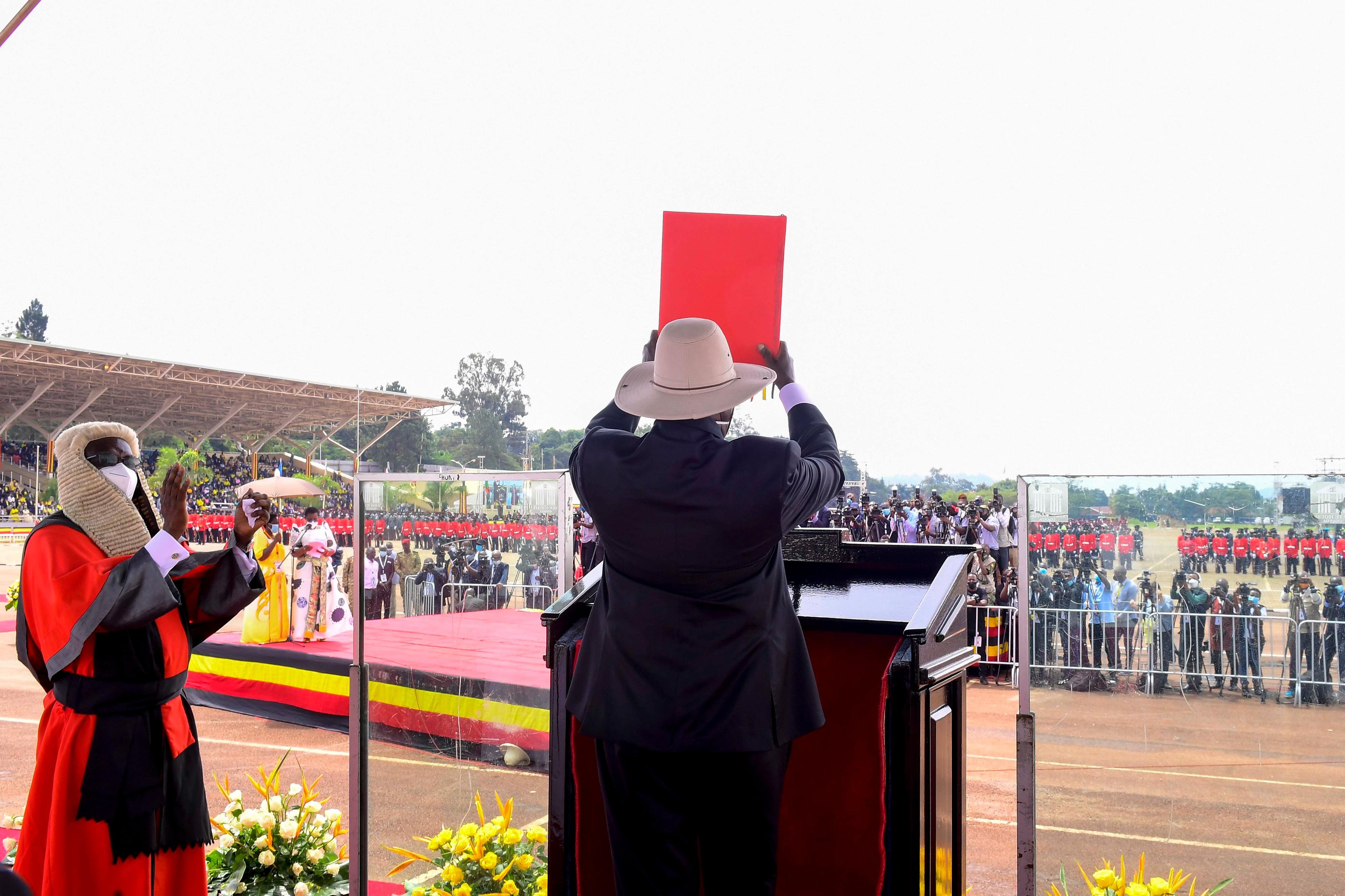Court to hear translation of Constitution case

President Museveni raises the Constitution which was handed to him by Chief Justice Alfonse Owiny-Dollo (left), after taking an oath during his swearing in ceremony at Kololo on May 12, 2021. PHOTO/ PPU
What you need to know:
- They also want court to compel government to cause the review of the education curriculum.
The High Court in Kampala has ruled that government was rightly sued for its failure to translate the Constitution into all indigenous local languages.
To that effect, Justice Boniface Wamala has ordered the hearing of the law suit filed by two concerned lawyers; Martins Kirya and Michael Aboneka, on its merits.
“In all, therefore, the preliminary points of objection raised by counsel for the defendant (Attorney General) and the counter objection raised by council for the plaintiff have all been found to be devoid of merit and have been dismissed,” ruled Justice Wamala on Monday.
“The suit shall be fixed for hearing on the merits. The costs of this proceeding shall be in the cause,” he added.
The court ruling comes after government lawyers raised two preliminary objections that they thought would technically have the matter disposed off. The preliminary objections were that the law suit does not disclose the cause of action against government and that the law suit was filed following a wrong procedure.
But Justice Wamala has since rejected the preliminary objection fronted by government.
In the main case that is now set to be heard on its merits, the petitioners claim government has failed to translate the 1995 Constitution that has been in existence for more than 26 years into 56 indigenous languages.
The petitioners aver that as a result of government’s failure to carry out this core mandate, there has been increased denial of rights awareness leading to the violation of citizens’ rights.
“As a result of the above, many Ugandan citizens, especially those that cannot comprehend the English language and the illiterates, have been denied an opportunity to be informed of their inherent rights as enshrined in the 1995 Constitution which are written in English,” court documents read in part.
The petitioners add: “Wherefore, the plaintiffs pray that the defendant (Attorney General) has unreasonably and deliberately failed in its duty to cause or to have finished the translation and disseminated of the 1995 Constitution into aforementioned various languages to the prejudice of the citizens.”
Further in their law suit, the duo contend that being indigenous Ugandans as described in the third schedule of the Constitution and other Ugandans, they are entitled to have the Constitution translated and disseminated into their local languages, which hasn’t been done by the government, 26 years later.
They add that having been born Ugandans, they are entitled to have been taught the Constitution during their school days from primary level to university as an obligation of the State but this was deliberately ignored.
Mr Kirya and Mr Aboneka, among other prayers, want court to compel government to start translating the Constitution into the local languages and the same be completed within two years from the date of judgment.
They also want court to compel government to cause the review of the education curriculum of all education, training institutions within one year from the date of judgment, promote the full awareness and the teaching of the constitution.
Additionally, they want in fulfilment of the above, government to consider customising the translated versions of the Constitution for visually impaired persons into usable formats.
Uganda’s indigenous communities
Uganda’s indigenous communities as at February 1, 1926 are Acholi, Alur, Baamba, Babwisi, Bafumbira, Baganda, Bagisu, Bangungu, Bagwe, Bagwere, Bahehe, Bahororo, Bakenyi, Bakiga, Bakonzo, Banyankore, Banyara, Banyole, Banyoro, Baruli, Basamia, Basoga, Basongora, Batagwenda, Batoro, Batuku, Batwa, Chope, Dodoth, Ethur, IK (Teuso), Iteso, Jie, Jonam, Jopadhola, Kebu (Okebu), Kuku, Kumam, Langi, Lendu, Lugbara, Madi, Mending, Mvuba, Napore, Nubi, Nyangia, Pokot, Sabiny, So (Tepeth) and Vonoma.




